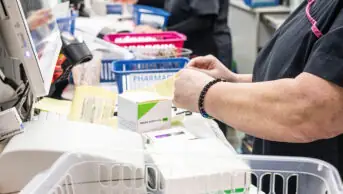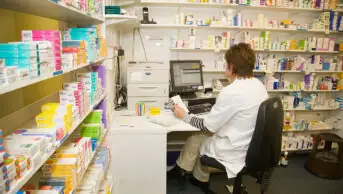
Shutterstock.com
Pharmacy trainees will be given “at least 90 hours” of supervised practice in independent prescribing as part of the new foundation year programme — but it is not expected to come into effect until 2025, the General Pharmaceutical Council (GPhC) has said.
In draft papers published ahead of its November council meeting, the GPhC set out a framework that would enable trainees to acquire “simultaneous registration and annotation” as an independent prescriber, following the final year of an overhauled initial education and training pathway.
The aim for trainees to become independent prescribers at registration was first proposed by the GPhC and the four UK chief pharmaceutical officers in July 2020, when it was announced that the current pre-registration year would be replaced with a national foundation year from summer 2021.
The GPhC later clarified that independent prescriber training would not form part of the foundation year from 2021. Instead, the regulator has told The Pharmaceutical Journal that students starting the first year of their MPharm in 2021 would be “the first cohort who would receive their education and training under the new standards”, becoming independent prescribers at the point of their registration in 2026.
Under the latest set of revised initial education and training standards for pharmacists, students will be taught “underpinning knowledge and theory” around independent prescribing during the four-year MPharm degree.
This will be followed by a foundation training year that will include “specific practical learning” for independent prescribing.
Training for the foundation year will be delivered by both the statutory educational bodies and employers, with higher education institutes undertaking elements of the independent prescribing training.
Of the 52 weeks of practical training within the foundation year, “trainees must complete at least 90 hours of supervised practice directly related to training to be an independent prescriber”, the papers say.
It adds that the independent prescribing training “must take place in clinical settings with direct access to patients”, with trainees learning “to prescribe under the supervision of a designated prescribing practitioner (DPP)”.
DPPs will be expected to “to liaise with higher education institutions regularly about the progress of trainees”.
“Trainees must pass all summative assessments and be declared competent by their DPP in order to pass the independent prescribing element of the programme.”
However, the papers highlight an “insufficient number of DPPs available to supervise and sign off trainees in the foundation training year” as a potential obstacle to the standards.
Training may also be hindered by the “limited opportunity in some settings for individuals to prescribe and a consequent risk if they were not using their skills on a regular basis”, the papers say.
Gail Fleming, director for education at the Royal Pharmaceutical Society (RPS), said the RPS supported the proposals but “would like to see clarity relating to the governance of the year five foundation year and we would like to see independent prescribing more fully integrated into the full five years of training”.
“We would also like to see the proposed learning outcome domains aligned to those used in postgraduate competency frameworks, so that the development of knowledge, skills and behaviours in professional practice; communication and collaborative working; leadership and management; education and research across the different levels of practice is explicit,” she said.
The GPhC said that “once the standards are finalised, universities will begin work to gradually implement these new standards in their courses”.
“Once the standards are implemented, the underpinning skills and knowledge for independent prescribing will become an integral part of the MPharm degree, with the majority of the practical learning forming part of the foundation training year,” a spokesperson said.
“The standards incorporate the aim that students starting their MPharm degrees from next year (2021) will be independent prescribers at the point of registration (2026).”


